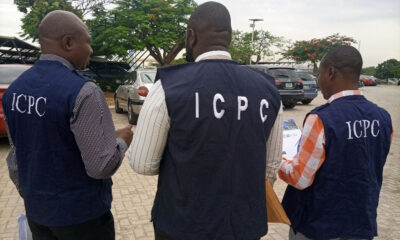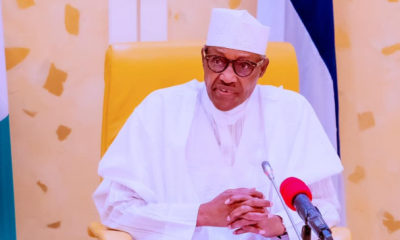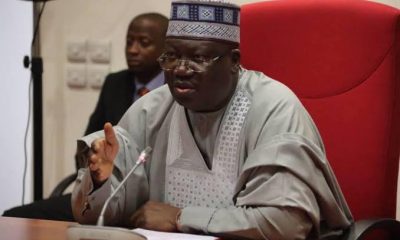metro
2022 Budget: Research Institute’s Bid To Execute N80bn Constituency Projects Raises Eyebrows

An advertisement placed by the Nigerian Building and Road Research Institute (NBRRI) in some Nigerian newspapers on Monday April 18, 2022, calling for bids for ‘2020 direct line capital and zonal intervention projects worth about N80 billion has raised eyebrows, Daily Trust on Sunday can report.
While observers have said it was an aberration for NBRRI to delve into capital projects which are outside their core mandate, the agency said they cannot reject constituency projects brought to them for execution by federal lawmakers.
Daily Trust on Sunday reports that apart from NBRRI, many government MDAs have been running newspaper adverts calling for bids to execute contracts considered to be outside their core mandates.
In the advertisement under reference, the research institute (NBRRI) expressed its desire to execute some capital projects under the 2022 Budget Appropriation.
The scope of work, as contained in the advert, involves the construction of classroom blocks, skills centres/town halls, construction of earth roads, with hydraulic structures, asphalt overlay, solar street lights, motorized boreholes, and supply of goods, among other projects.
This has, however, raised questions as to why an agency of government with the core mandate of conducting research would be involved in executing capital projects.
NBRRI’s mandate
NBRRI is a parastatal under the Federal Ministry of Science and Technology.
Established in 1978 to carry out research and development activities into the many aspects of the industries in charge of building and construction of roads, its statutory function, according to our findings, is to conduct coordinated applied research and development into the many sections of the building and construction sectors of the economy.
READ ALSO:
- PENCOM alleges blackmail over N3m monthly salary claim
- NAF Bombs Bandits Attending Naming Ceremony At Turji’s Home
- We don’t kill known enemies let alone an Igbo man, IPOB replies FG
Some of the areas in which NBRRI is mandated to conduct research, according to our findings, are the following: Local building and construction materials to determine the most effective and economic methods of their utilization; architectural design of buildings to suit Nigerian climatic conditions with respect to lighting, ventilation, thermal comfort, and humidity; the design and performance of functional units in buildings including electrical installations, plumbing, painting, drainage, ventilation, and air-conditioning system; local construction, foundation and earth-works for buildings and bridges, especially on problem soils.
In 1993, the mandate of the institute was said to have been further expanded to include Research and Development (R&D) into all possible aspects of materials of engineering which are used in relation to the construction industry, our findings reveal.
Questions trail bid for over 500 constituency projects
However, a scrutiny of the advertisement indicates that NBRRI invited bidding for over 500 projects in different parts of the country which were categorized into A, B, C, D and E.
While category ‘A’ sought pre-qualification for 48 projects, including works, goods, and services, category ‘B’ invited bids for 263 projects.
In the same vein, category C invited tenders for 12 projects while categories D and E sought to bid for 6 and 30 projects respectively.
Questions are being raised over the inclusion of 80 per cent of the projects which are constituency related and considered to be outside the mandate of the organization.
For instance, under category A, the research institute plans to execute projects believed to be outside its jurisdiction, among which is the erection of high-intensity solar street lights for surveillance in selected areas of Surulere, Lagos.
Besides calling for bidding to undertake a project for the development of a 150kw solar mini-grid for the off-national grid at Kwalita village, Dobi, Gwagwalada in the FCT, it also sought to undertake the provision of high-efficiency solar street lights within and around some schools and rural communities in North-Central, North-West, and South-West for security surveillance.
Other ‘strange’ projects NBRRI has called for bid to undertake include the procurement of freezers, fridges, generators, grinding machines, vulcanizing machines for youth empowerment in Anambra State, the provision of educational materials in Gindiri, Plateau State, as well as the supply of classroom furniture at Ojokoro, Ashafa, Irepodun communities.
Also, the agency plans to undertake projects for the supply of classroom furniture in the Aiyetoro-Ajeromi and Badagry communities, equipping of the Central Auditorium and Multi-Purpose Hall in Naki Gori and Yola Wakat in the North-Central zone, and the supply of empowerment as well as provision of empowerment items to women at Danmaje and other LGAs.
Similarly, NBRRI is being questioned over its bid to undertake a project for capacity building and empowerment of indigents on cassava value-chain by-products in Anambra North.
READ ALSO:
- I’m out to win 2023 election, Kola Abiola declares
- Four-storey building collapses in Uyo, many trapped, four rescued
- Osinbajo away to London for Queen Elizabeth’s funeral on Monday
Under category ‘B’ as contained in the advert, which is tagged ‘technical and financial bid’, NBRRI invited bid to undertake a project for the installation of its (NBRRI) fabricated solar streetlight in Gombe Sought LGA, provision and installation of NBRRI fabricated integrated solar streetlights to communities in Awe, Doma, Keana Federal Constituency of Nasarawa State, as well as a contract for what it tagged ‘using NBRRI finished products on rural road construction technology in Ikenne LGA of Ogun State.’
While calling for a bid to undertake a project for the provision of health treatment, supply of drugs, and health insurance for the people of Ibadan, the NBRRI advert also sought to supply and install all-in-one solar street lights in all the six geopolitical zones, according to the tender.
This is in addition to seeking bids for the provision of health treatment, supply of drugs, and health insurance for the people of Ibadan, Oyo State, as well as the construction of solar-powered boreholes and solar-powered streetlights in Idemili North and South Federal Constituency of Anambra State.
Also advertised for bidding by NBRRI is a contract for the provision and installation of streetlights at Aiyetoro, Gbede, in Kogi West Senatorial District, and another for the supply and installation of 3-in-1 solar streetlights at various locations in Nasarawa South.
It’s an aberration – Rafsanjani
Auwal Musa Rafsanjani, the Executive Director of Civil Society Legislative Advocacy Centre (CISLAC), said it was an aberration for a research-based organisation like NBRRI to be undertaking constituency projects.
“Aside from being a negation of the mandate given to them, it is also a clear case of non-adherence to the Public Procurement law. If the National Assembly lawmakers are asking them to do a wrong thing as in this case, they should reject that and stay within their mandate.
“They (NBRRI) should remain within their research-based mandate and stop aiding corruption while the National Assembly should understand that there is a need for a legal framework to avoid diversion,” Rafsanjani said.
However, another source said the fact that the projects were advertised in the national dailies, meant the due process was followed. “Many government agencies go beyond their mandates to solve problems. I am not saying the NBRRI has the mandate to go into constructing roads or providing boreholes. I am also not saying they don’t have the mandate,” said the source who wished to remain unnamed.
We can’t stop lawmakers from domiciling constituency projects with us – NBRRI
The management of NBRRI said it cannot stop the National Assembly lawmakers from allocating their projects to them.
READ ALSO:
- Two survive as car tumbled off Otedola bridge
- Just in: Tension in Ebonyi as police teargas Obi supporters, disperse rally
- Blame FRSC, states, not motorists, for faded number plates – NAJA
NBRRI’s Chief Information Officer, Peter Mashem, said: “We have tried several times in the NASS to tell them that this is not within our mandate but they still tell you ‘look, it has been signed already; it is an appropriation.”
He explained that the lawmakers started bringing constituency projects to them when they started promoting some of their technologies by building skills acquisition centres in order to create awareness and promote their activities for people to know what they were doing.
“That promotion of these skills acquisition centres was what these lawmakers began to see and say we can take these to our constituencies; that was how we got involved in all these. So, technically, it is our mandate because we were doing promotion which is good for us also.
“But I can assure you that we do a lot of checking to ensure that the money is utilized and the projects reach conclusion; it is not as if they (lawmakers) use us here. We ensure that the projects get to 100 percent conclusion.
“We supervise and issue out the money; if you come and get the bid, we give you part of the money to start with and when you come back with pictures, we give you the second batch,” Mashem said.
‘NASS not in a position to react’
When contacted, the Director of Information to the National Assembly, Agada Rawlings Emmanuel, said the matter falls within the purview of the political leadership who passed the bill to law.
“Accordingly, you can reach out to the spokesperson of the Senate for further necessary insights or at best, get to read through the Act, which is now a public document, and have a proper understanding of their mandates to draw necessary conclusions on the issues of your concerns.”
However, a senior official in the National Assembly, who preferred not to be named, said there was no relationship between the federal parliament and the execution of capital projects by government agencies except the constitutional role of oversight.
“The National Assembly has no business with any government agency’s capital projects other than oversight to ensure that Nigerians are not short-changed in whatever they do,” the official said.
metro
Ex-LG chair challenges El-Rufai’s claims on council funds
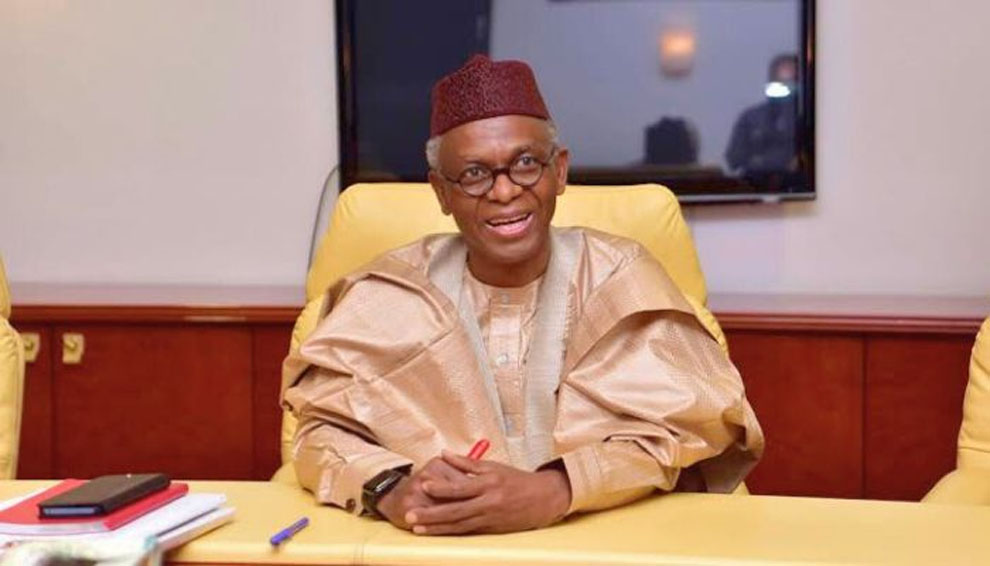
Ex-LG chair challenges El-Rufai’s claims on council funds
Former Secretary of the Association of Local Governments Of Nigeria (ALGON), Kaduna State chapter, Alhaji Kabiru Jarimi, has refuted ex-Governor Nasir El-Rufai’s claim that he never interfered with Area Councils’ funds during his tenure.
Jarimi, who served under El-Rufai’s administration, described the claim as misleading, stating that funds were routinely deducted from councils’ allocations under various guises by the previous government.
The ex-ALGON State Secretary, who is also the former Chairman of Kaduna South local government, disclosed this in an interview over the weekend.
“I was shocked by El Rufai’s comment because local government funds were deducted without our approval. Most of the deductions targeted Southern Kaduna LGAs.
READ ALSO:
- Some ladies in movie industry ready to sleep their way to fame — Jide Kosoko
- Gunmen abduct Catholic priest in Anambra
- Adeleke University didn’t suspend Muslims for praying – MSSN
“We never got our full allocations under El-Rufai. His government kept introducing policies to deduct funds unnecessarily. I even considered resigning. At times, we had no funds for overhead costs after paying salaries,” he recalled.
Jarimi, who said that El-Rufai justified the deductions as necessary to settle workers’ salaries, further noted that the state government also employed various means to withdraw additional funds.
The former Council Chairman cited the creation of the Kaduna Capital Territory Authority, Zaria Metropolitan Authority and Kafanchan Municipal Authority as a means of shortchanging local governments.
“Salaries were shared 60–40 between the capital territories and LGs around them. In Kaduna South, deductions were made in the name of sanitation, forcing us to remit funds to the Kaduna Capital Territory Authority (KCTA) every month,” he stated.
The former Chairman further alleged that the funds of local governments outside the capital territories were also deducted without explanation, citing deductions for security and ‘riot damage.’
Ex-LG chair challenges El-Rufai’s claims on council funds
metro
Gunmen abduct Catholic priest in Anambra

Gunmen abduct Catholic priest in Anambra
A Catholic priest, Rev. Fr. Stephen Echezona of St. Patrick Church, Ichida, has been reportedly abducted by gunmen in Anambra State.
According to a report by security analyst and counter-insurgency expert, Zagazola Makama, the incident occurred around 6:00 p.m. on Saturday when four armed men, operating in a white Lexus 330 SUV with an unknown registration number, intercepted the cleric and whisked him away along with his Toyota Highlander SUV.
READ ALSO:
- Adeleke University didn’t suspend Muslims for praying – MSSN
- Juventus to sign Osimhen with player-plus-cash offer
- Police inspector kills one, injures two, holds colleagues hostage in Calabar
A joint team of security operatives and local vigilantes (AVG) were said to have responded swiftly to the attack, pursuing the assailants and engaging them in a gun duel at a road intersection between Oraeri and Akwaeze villages.
Though the criminals managed to escape, their Lexus SUV sustained significant damage, including a shattered rear windshield.
The Anambra Police Command is yet to release a statement on the abduction of the priest.
Gunmen abduct Catholic priest in Anambra
metro
Adeleke University didn’t suspend Muslims for praying – MSSN
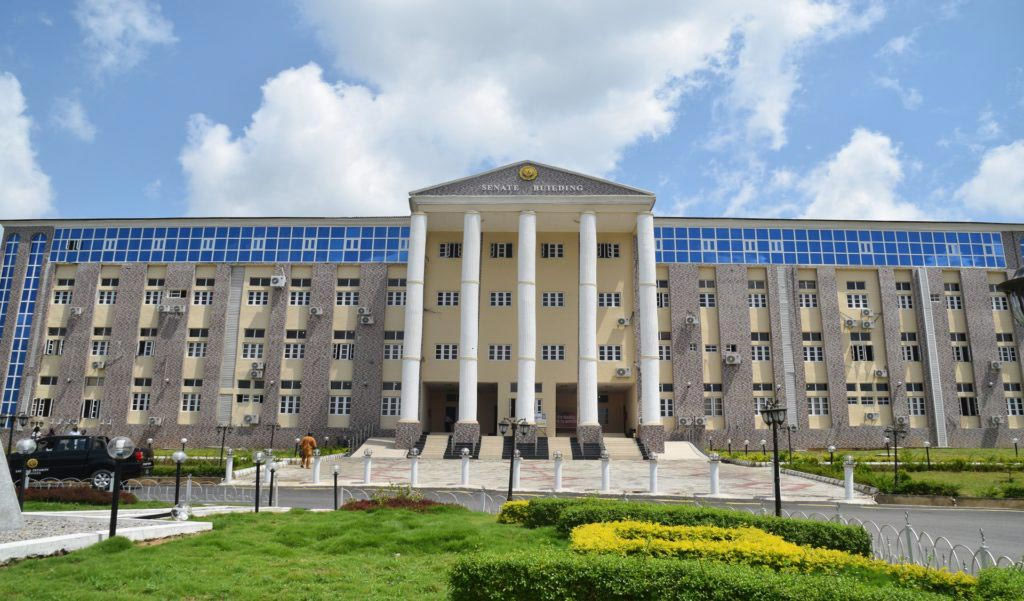
Adeleke University didn’t suspend Muslims for praying – MSSN
The Muslim Students’ Society of Nigeria (MSSN), Adeleke University Branch, Ede, Osun State, has described as “fake news” a statement credited to MURIC which alleged the suspension of a Muslim student of the university over Friday prayers.
The association, in a statement signed by its Ameer, Imran Adigun AbdulHakeem, on Sunday, said MURIC’s reports circulated on social media were a misrepresentation of happenings within the university, saying “our faith is respected by the management.”
In another letter, the association apologised to the director and facilitator of the university, Chief (Mrs) Dupe Adeleke-Sanni, whom the association credited with providing a conducive atmosphere for Muslim students to practise their faith.
The letter reads: “On behalf of the Muslim Students Society of Nigeria (MSSN), Adeleke University Chapter, [I] write to address the ongoing misinformation circulating on social media and other platforms regarding the suspension of Muslim Students for praying on Campus.
“On the 14th of March, 2025, we were temporarily suspended from observing our Night Ramadan Prayers (Taraweeh) and Jummat prayers on campus on the orders of the Director of Security Service (DSS).
“However, on the 18th of March, we met with Dr. Mrs. Modupe Adeleke regarding these challenges.
READ ALSO:
- Juventus to sign Osimhen with player-plus-cash offer
- Police inspector kills one, injures two, holds colleagues hostage in Calabar
- Fresh explosion rocks gas facility in Rivers
“She provided us with a place where we could observe Ramadan, Jummat prayers, and the five daily prayers which we accepted. As a result, the suspension has been lifted, and we have resumed prayers at the new location provided by the university on the orders of Dr Modupe Adeleke.
“At no time have Muslim Students been forced to change their beliefs. While challenges may arise in any diverse academic institution, the university management has always been open to dialogue, and we have continued to receive support in practicing our faith.
“Adeleke University has provided a peaceful and respectful environment for all faiths, and we continue to practice our religion freely.
“We urge the public to disregard the misinformation that may have been spread regarding this matter as they do not reflect the reality of our experiences,” the letter to the university management noted.
The letter of apology to Chief (Mrs) Dupe Adeleke-Sanni reads: “As-salamu alaykum (peace be upon you). On behalf of the Muslim Students’ Society of Nigeria (MSSN), Adeleke University Chapter, I apologize for any distress caused by the false social media reports.
“We assure you that we had no hand in spreading the misinformation. We are deeply grateful for your unwavering support, guidance, and kindness towards us.
“Your commitment to our well-being and academic success is invaluable, and we appreciate everything you’ve done for us. May Allah (SWT) reward you abundantly for your good deeds. Jazakumullah khairan (may Allah reward you with goodness).
“Thank you for being an exceptional Mother and mentor. We are blessed to have you,” the letter added.
Adeleke University didn’t suspend Muslims for praying – MSSN
-

 metro3 days ago
metro3 days ago‘We’re not hiring,’ NNPC denies viral recruitment adverts
-

 metro2 days ago
metro2 days agoNatasha: Court blocks recall attempt, stops INEC
-
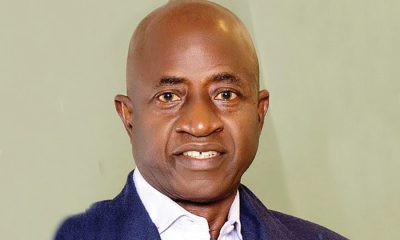
 Sports2 days ago
Sports2 days agoOdegbami speaks on Osimhen breaking his 44-year goals record
-

 Entertainment2 days ago
Entertainment2 days agoI didn’t snatch Asake’s mother from her husband -Musibau Alani
-

 Sports3 days ago
Sports3 days ago2026 WCQ: Super Eagles move up to third place with 2-0 win in Rwanda
-

 Sports3 days ago
Sports3 days agoOsimhen breaks Odegbami’s Eagles goal record
-

 metro2 days ago
metro2 days agoBoko Haram attacks military base in Adamawa
-

 metro2 days ago
metro2 days agoOluwo accuses Ooni of plotting to dethrone him

